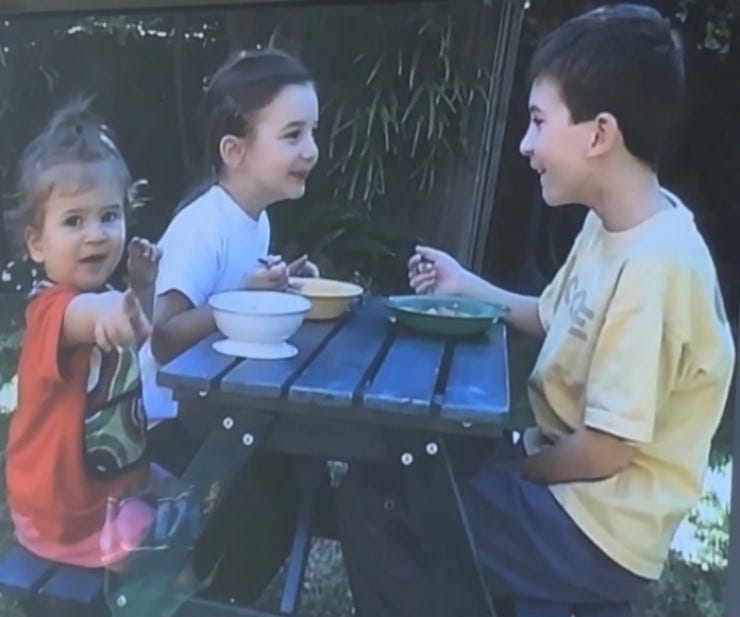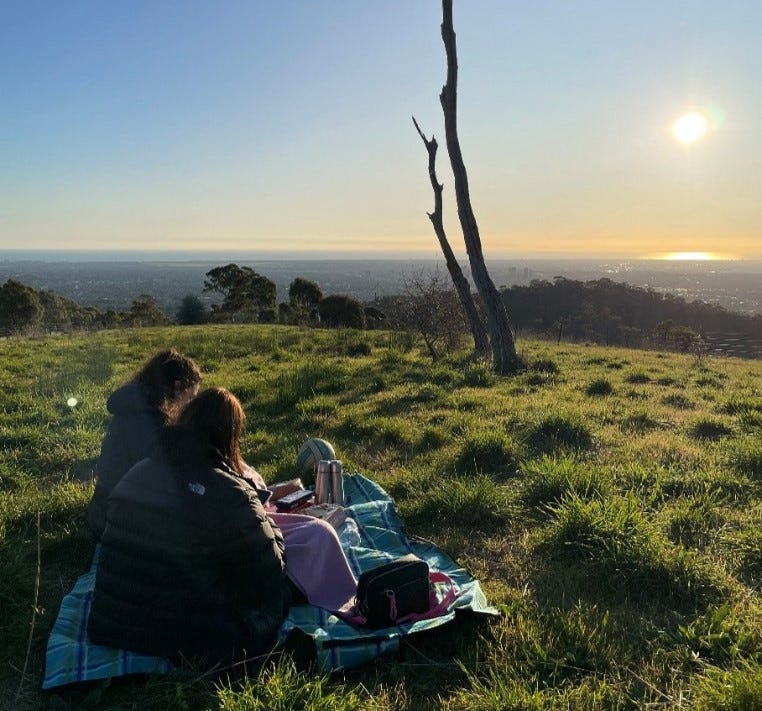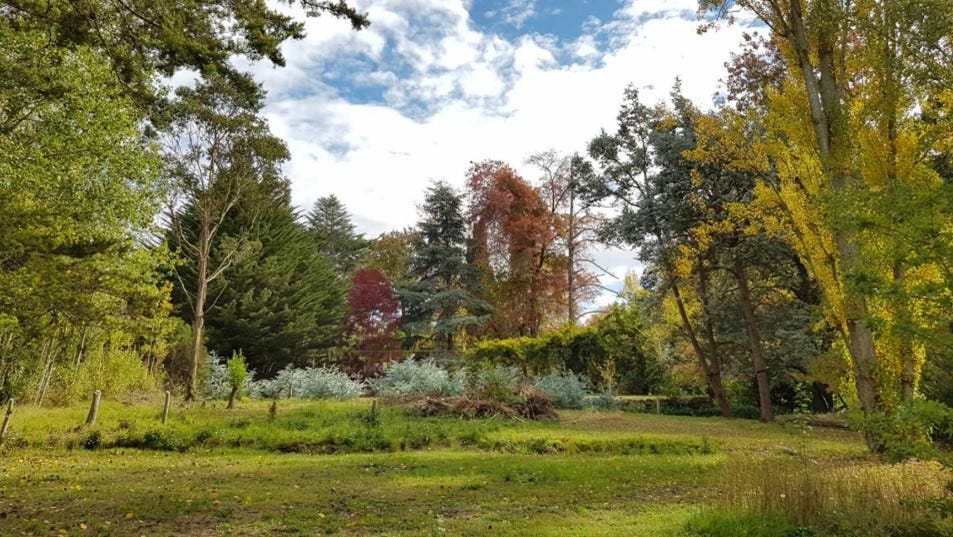“There are few things so pleasant as a picnic eaten in perfect comfort” (Maugham, 1944, p.147), so the best memories are formed on a picnic blanket, sharing food, laughter, and stories in the open air.
Beginnings: shaping identity from childhood
Many of my fondest childhood memories center on shared activities with my two older siblings and parents, particularly the time we spent together during family meals. From an early age, our family prioritized dining together, fostering a strong sense of connection and making me feel valued and close to my loved ones. Recognizing the importance of these connections from their own childhood experiences, my parents emphasized family meals as a cherished tradition, deeply embedded in our family values. Research supports this practice; Eisenberg et al. (2004) found that frequent family dinners serve as a protective factor for adolescents' health and well-being while also strengthening family connectedness.
Meals fostered an early appreciation of our Italian culture. Every Sunday after church, my Nonna would fill the table under the pergola with antipasti, then pasta, meat and salad for seconds. Soon after lunch, the espresso would be brewed, and the Italian ‘Briscola’ cards would be dealt to family members for a fun match. These family meals were more than just food; they contributed to my early understanding of what was valued in Italian culture. I tried new foods and developed a deep fondness for Italian cuisine. In Italian culture, family meals are sacred, a value deeply ingrained in our family traditions. As a child, I would eagerly leave the table to play, but as I grew older, I found every reason to stay. I didn't fully understand the importance of these communal meals at the time, but now I see how they were pivotal in shaping my identity and my passion for shared meals with loved ones.
Overcoming adversity
Building on the foundation of childhood social connections, my resilience has been shaped by the inevitable adversities encountered throughout life. As the challenges of adulthood arrived, I was forced to adapt and grow. When we first began our family picnic tradition, it was casual and light-hearted. However, as life brought hardships like divorce, cancer diagnoses, and emotional pain, these gatherings evolved in meaning. Recently, my Nonna's declining health following an unexpected diagnosis has been particularly difficult. During such times, our picnics became more than just a tradition—they became a space for our family to come together, support one another, and find solace. Sharing meals in nature allowed us to momentarily unwind and reconnect, creating a sense of social connectedness and belonging that became a vital source of strength during the most challenging seasons of our lives.
According to Zlotnick et al. (2022), self-identity is comprised of exploration and achievement, with the belonging aspect of identity demonstrating a positive relationship with resilience. Our emphasis on gathering created a sense of belonging, which in turn increased our resilience to persist through hardship. Martin Luther King Jr. encapsulated the essence of this journey, when he said, “today our very survival depends on our ability to stay awake, to adjust to new ideas, to remain vigilant, and to face the challenge of change” (King, 1967). This reminds me how adapting to and overcoming life's challenges is crucial for developing a resilient and strong sense of self-identity. By navigating adversity, I have developed empathy, and a greater understanding of the diverse ways people cope with hardship. This personal growth has not only strengthened my resilience but also equipped me with the insight and compassion needed to be a useful support to others. I have a developing an understanding of how to deal with unexpected loss and grief. It is clear to me that without adversity, I would not have had the opportunity to lean on my support systems, self-evaluate, and learn to use my experiences as an opportunity to advocate for others.
Healing through communication
Active listening, validating emotions, and using reflective questioning are all key communication strategies that validate experience and build rapport (Brown et al., 2020). Along with growing from life's challenges, our picnics provide opportunities for communication and sharing stories, which has played a vital role in the healing journey for myself and family members. When gathering for our family picnics a shared meal means a shared conversation on life. This has given me opportunity to understand better the experiences of my family members, and to connect with my Nonna, who is living with a cancer diagnosis while dealing with the grief of losing her mum.
Mindful of nature
There is a growing body of research indicating that natural environments improve attention, executive function, and reduce cortisol levels (Jimenez, 2021). Our picnics often take place on my family’s property in the Adelaide Hills. We gather blankets and chairs, setting up under my favourite horse chestnut tree, which casts a broad, comforting shadow over the open area. Away from our usual busied lifestyle, we hear the chirping of birds and the faint gushing of the stream that runs through part of our land. These sounds and sights allow me to slow down, breathe deeply, and fully embrace the sensory experience of nature.
I also feel more in touch with my faith, which is a significant aspect of my identity, when I am in nature. Natural environments are often welcoming and encourage new avenues of connection between individuals and the surrounding flora and fauna. This sense of connection and mindfulness enhances my emotional well-being and reminds me of the importance of balance and unplugging in daily life.
The thread that brings it all together
I recognise that we are holistic beings, and our identity is like a tapestry of threads, making up our identity, experiences, childhood, values, culture. My own journey is one of loss and celebration, communion, and connection. The threads of my personal story create a vibrant mixture of my experiences, triumphs, adversary and make up a picnic blanket reflective of my personal identity. Like a picnic brings individuals together, the picnic blanket is brought together by the threads, all different but cohesive. I never want to underestimate the importance of the small threads in the bigger picture of the client’s whole blanket. My hope in this is that one day, as a therapist, I can be one thread in the richness of other lives who are going through their vulnerable times.
References:
Brown, T., Yu, M., & Etherington, J. (2020). Listening and interpersonal communication skills as predictors of resilience in occupational therapy students: A cross-sectional study. British Journal of Occupational Therapy, 84(1), 30–38. https://doi.org/10.1177/0308022620908503
Christiansen, C. H. (1999). Defining lives: Occupation as identity: An essay on competence, coherence, and the creation of meaning. American Journal of Occupational Therapy, 53(6), 547–558. https://doi.org/10.5014/ajot.53.6.547
Eisenberg, M. E., Olson, R. E., Neumark-Sztainer, D., Story, M., & Bearinger, L. H. (2004). Correlations between family meals and psychosocial well-being among adolescents. Archives of Pediatrics & Adolescent Medicine, 158(8), 792–796. https://doi.org/10.1001/archpedi.158.8.792
Jimenez, M. P. (2021). Associations between nature exposure and health: A review of the evidence. International Journal of Environmental Research and Public Health, 18(9), 4790. https://doi.org/10.3390/ijerph18094790
Lee, A. (2019). The history of the picnic. History Today. https://www.historytoday.com/archive/historians-cookbook/history-picnic
Leone, A. (2024, March 15). Interview by [Amy Leone]. In [Amy Leone], Annotated bibliography (Appendix 4).
King, M. L. (1967). Where do we go from here: Chaos or community? Beacon Press.
Maugham, W. S. (2003). The razor's edge. Vintage International. (Original work published 1944)
Yerxa, E. J. (1990). An introduction to occupational science: A foundation for occupational therapy in the 21st century. Occupational Therapy in Health Care, 6(4), 1–17. https://doi.org/10.1080/j003v06n04_04
Zlotnick, C., Manor-Lavon, I., & Srulovici, E. (2022). Resilience in late adolescence/young adulthood: Rising to the occasion? Military Psychology, 34(5), 530–540. https://doi.org/10.1080/08995605.2021.2017190
Bio
Amy Leone wrote this scholarly personal narrative in 2024 while studying to be an occupational therapist at UniSA








Oh what a moving and lovely reflection Amy. How much the simple action of dining as a family can hold! A beautiful example of well-doing.